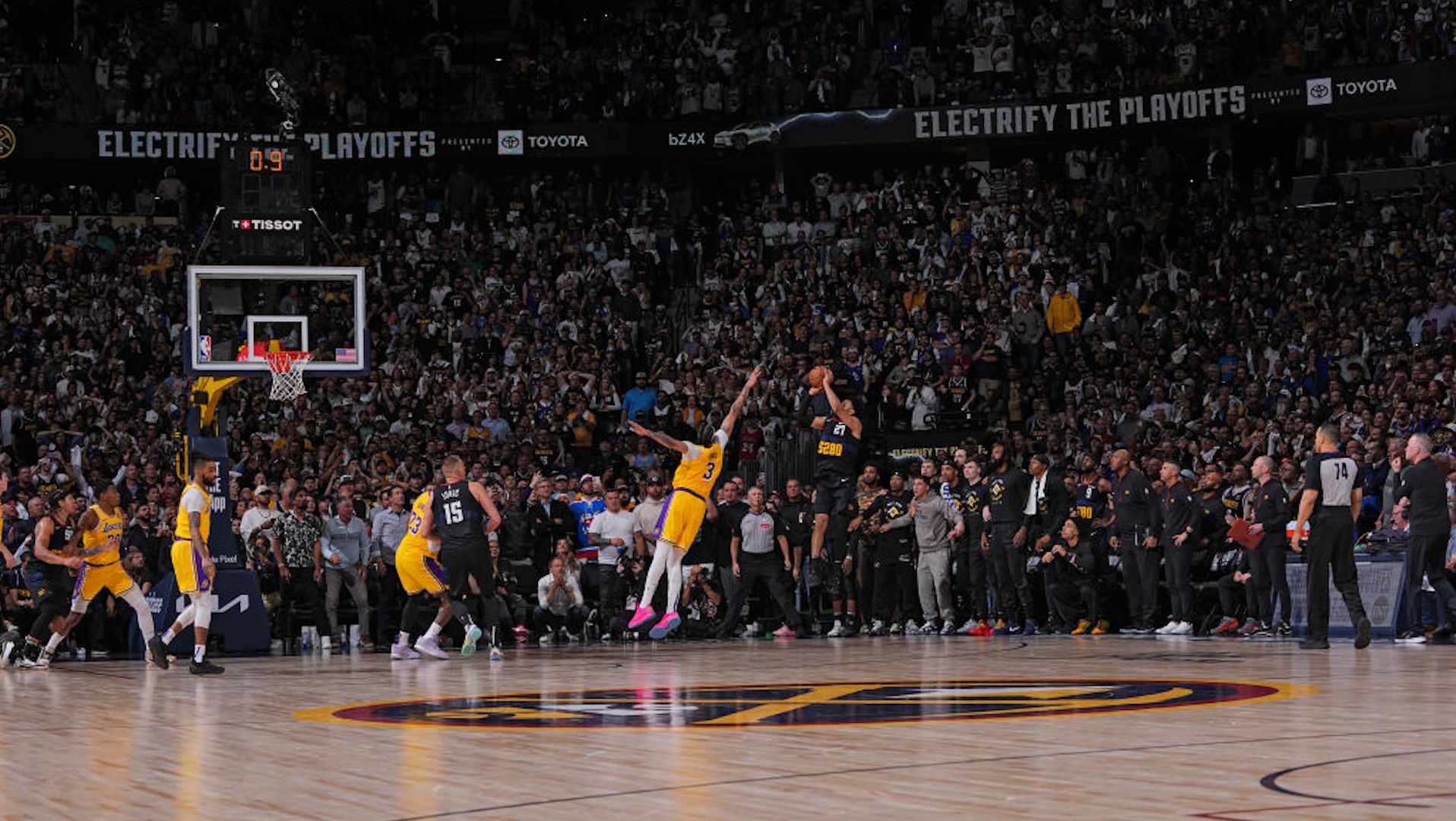Accumulate enough fondness for someone, and it becomes hard to remember past slights or disappointments that they've visited upon you. Stare into the eyes of your beloved as you share a meal, or a leisurely stroll through the park, and the bad times can't be further away. Argument? What argument? We never argue!
Perhaps this explains why whenever Jamal Murray has a bad quarter, half, or game in the NBA playoffs, I always feel blindsided by it. This is a guy who is as responsible as anyone for giving me some of my best moments as a sports fan, and so I never go into any game expecting him to cause me stress or anxiety. And yet he does exactly that, more often than my heart allows me to remember, and I never realize this until it's happening again.
For three quarters of Monday's Game 2 clash between the Lakers and Nuggets, it was happening again. Murray started the game on the wrong end of LeBron James's latest spectacular defensive highlight, and then spent most of the rest of it struggling through one of the worst performances of his career. By the end of the third quarter, Murray was 3-of-16 from the field, hadn't attempted a single free throw, and was a team-worst minus-14 in 27 minutes. The Nuggets were down 15 at halftime, but it was in the third quarter that Murray's struggles were most costly.
Denver spent that entire quarter locked in on defense, holding the Lakers to just 20 points in the frame. But they were only able to cut the lead to 10, largely because Murray couldn't make good on the other end of the floor. Nuggets fans have watched this team erase 12–15 point leads in a matter of minutes more times than they can count, and those runs tend to follow a familiar script: Denver's defense starts forcing turnovers and missed shots, the offense starts running in transition, and Murray hits two or three pull-up threes that bring the crowd to life and drain the opponent's will. That didn't happen this time, though, because Murray went 1-of-6 in the third quarter and all of his usual momentum-swinging shots missed badly.
Suddenly, all those memories of Murray's previous playoff stinkers were filling my head. "Jamal, please dude, come on," I muttered as each clanged jumper and stilted drive reminded me of how often I'd seen this game before. Our previous disagreements were suddenly exposed in my memory, like a picked scab: 3-of-15 against the Suns in Game 2, 5-of-17 against Miami in Game 4, 8-of-21 against Minnesota in Game 4. I could go on. Oh god. We argue all the time!
And then the fourth quarter started, and Murray got busy reminding me exactly why those previously catastrophic shooting nights are locked away from view in my mind palace. It's because more often than not, Murray manages to salvage something from even his worst performances. Sometimes it's nothing more than a well-made pass out of a double-team that helps the Nuggets close the game out, but it's often bigger than that. In Game 2, it was a game-winner for the ages.
That capped off a fourth quarter in which Murray went 6-of-8 from the field and scored 14 points. More than that, he outdueled LeBron James, who had 12 points in the quarter and hit a pair of back-to-back threes that were designed to kill the Nuggets dead by putting the Lakers up eight with just under six minutes left to play.
Shot-makers like Murray often get praised for their ability to not let stretches of bad shooting affect their confidence or willingness to fire away. We're always told about how the best and most successful athletes possess a level of self-belief that no amount of sustained failure can shake from them. I've always found that particular analysis to be shallow and overstated, particularly when it comes to Murray. When he's stuck in an awful shooting night, it's not because he's casting off without conscience, but because he's hesitant and unsure of himself. When he turns the corner off a Nikola Jokic screen, doesn't think quick enough to raise up for the open shot, and then over-dribbles into the paint before taking a contested floater or turning the ball over, you can feel the self-belief draining from his body.
Murray can feel it, too. During his postgame interview on TNT, he was honest about how all those missed shots and botched possessions had gotten into his head. He talked about how he wanted to defer to his teammates, who nevertheless told him to keep shooting even as he kept attempting "that bullshit floater," as he put it. "You miss four, five in a row, you miss six, seven in a row; everybody's telling you to keep shooting; you're missing bad on some of them, and then you miss 10, 11 in a row, 12 in a row, and it's like, 'Man, should I change something? Should I look at something else?'"
Should Jamal Murray change something? The 9-of-24 shooting night that he just tossed onto the pile of bad shooting nights that has grown steadily throughout his playoff career would suggest that he should. His championship ring, the litany of big plays he's made, and the swell that I felt in my chest upon seeing last night's game-winner find the net would suggest otherwise. Change? What could Jamal Murray possibly change? He's perfect. I love him. He never misses.






